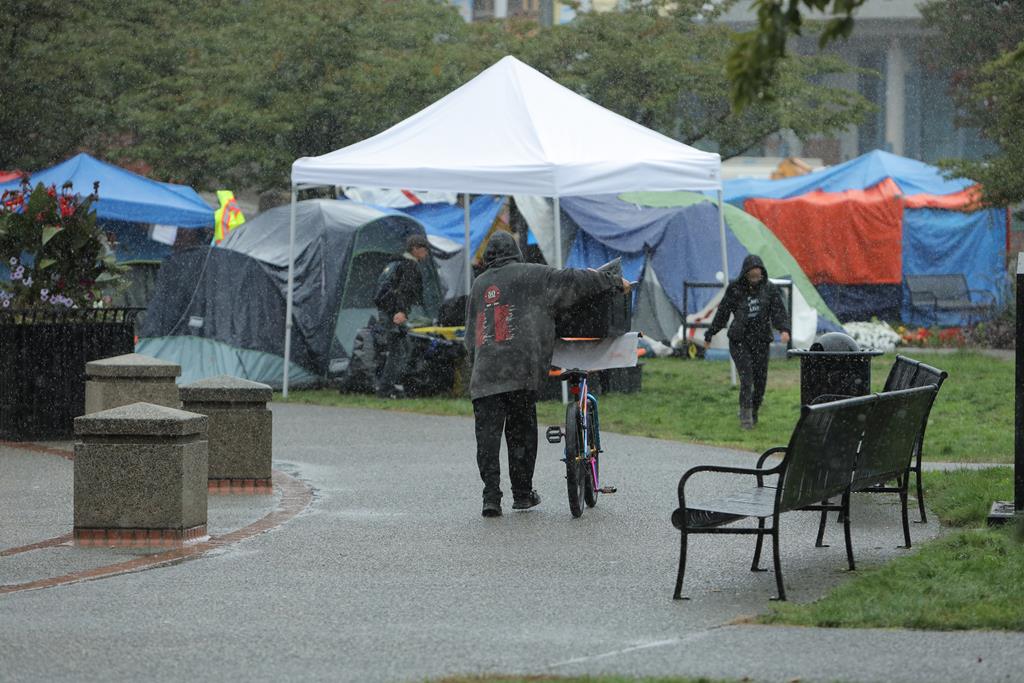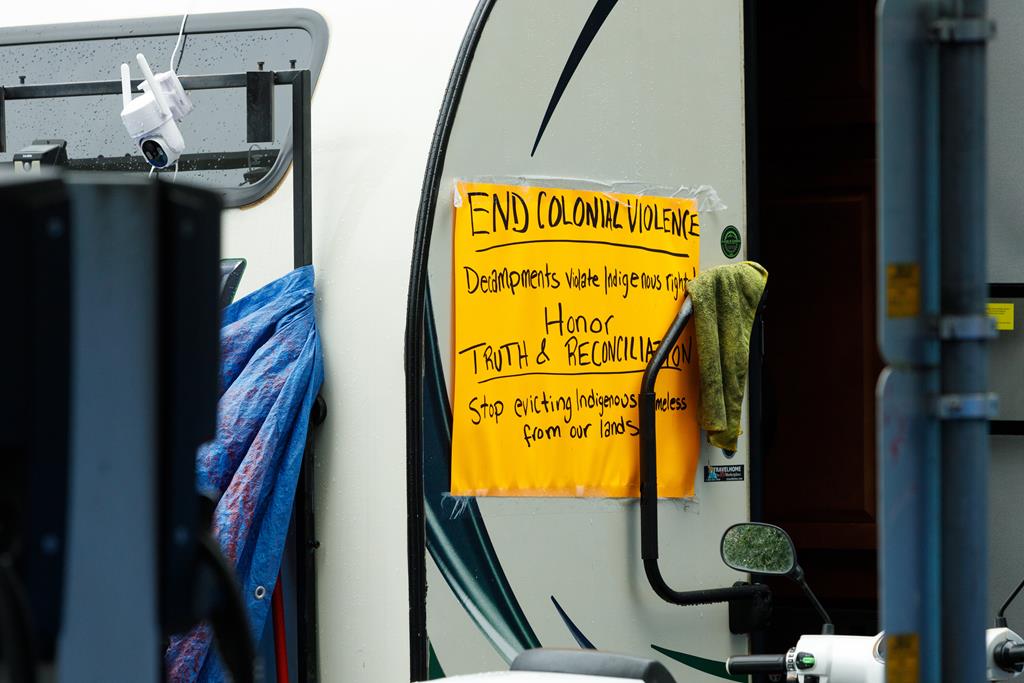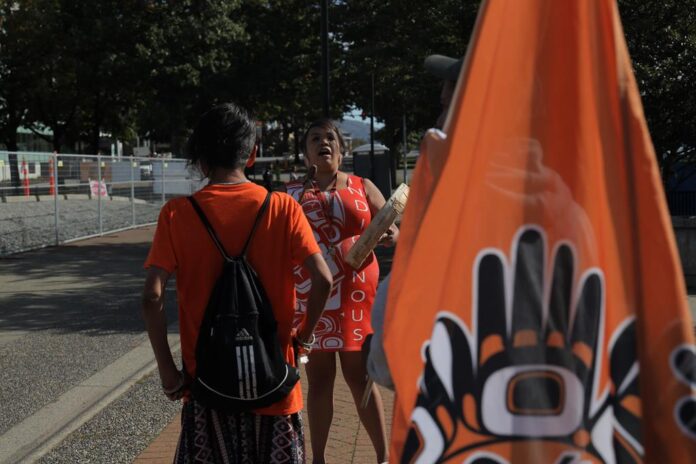The National Day for Truth and Reconciliation is intended to honour residential school survivors and the children who did not return home from these schools and to bring awareness to the 94 Calls to Action laid out by the Truth and Reconciliation Commission of Canada. The day coincides with Orange Shirt Day, a grass-roots Indigenous movement shining light on the generational colonial harm perpetrated in the past and the present. It is a time of mourning, grief, and heavy emotions for Indigenous communities, especially as the truth of the performative actions of reconciliation by municipal, provincial, and federal governments rears its ugly head.

On June 29, 2024, the DWS protest encampment was relocated to Abbotsford City Hall from their previous location at Babich Park. DWS, formally the BC Yukon Association of Drug War Survivors, is an advocacy group working to prioritize harm reduction policies while reducing stigma and discrimination associated with illicit substances and those impacted by them through community engagement, awareness, education, research, and policy change. DWS has played an active liaison role for the habitants of the protest encampment, especially as the events of the final week of September occurred.
These actions take place almost ten years after Supreme Court of British Columbia (BCSC) ruling, where DWS — filed on behalf of Barry Shantz, who was shot and killed by RCMP at his home in Lytton, B.C. in 2020 — challenged the use of certain by-laws that violated the constitutional rights of the homeless population, and most notoriously the eviction tactic of spreading of chicken manure on the campsite of the Happy Tree Camp on June 4, 2013. In October 2013 the encampment relocated to Jubilee Park, eventually habitating a wooden structure in the parking lot, which was to be vacated on Dec. 13, 2013. The encampment then relocated again to the Gladys Avenue Camp, where the city continued its displacement and intimidation tactics including eviction notices, deploying bear spray, and destroying and removing tents. Chief Justice Hinkson dismissed the City’s action, in addition to dismissing the claims for damages brought forth by Mr. Shantz.
On Thursday, Sept. 19, 2024, the City of Abbotsford issued habitants at the current DWS protest camp a notice of trespass, with a timeline to vacate the premises by the following Monday. Following is a timeline of events I witnessed and spoke to DWS supporters about since then:

Monday, Sept. 23: with police, by-law, and Recycle It employees on stand-by for city orders, no trespass ordinances were enacted, and attempts to forcibly dismantle the camp were made. Despite this, attempts to remove unoccupied tents were prevented by allies and supporters who occupied the temporarily vacant tents and were present as witnesses. The confinement fencing around the encampment was removed.
Tuesday, Sept. 24: DWS filed a short leave application with the courts, and served the city in the evening. The injunction was filed to prevent the City from enforcing the notice of trespass issued to the camp on Sept. 19, and would allow DWS more time to hire a lawyer, and compile accounts, evidence, and legal arguments in order to be fairly represented and judged.
Wednesday, Sept. 25: the short leave application is granted. Around 9:30 a.m., by-law officers began notifying residents of trespass. Fencing was reinstalled after a clear-out of about half the lower encampment area, corralling the encampment into a smaller zone.
Monday, Sept. 30: private security were positioned around the encampment, with “No Event Access” signs during the City’s Truth and Reconciliation day event, attempting to stop anyone other than encampment habitants from entering the city hall grounds where the protest was taking place. However, outside encampment supporters, including Augusta Gladstone who protested through song and drum, entered the public grounds anyway to show solidarity with the protest encampment.
Following are words and accounts from DWS protestors, supporters, and organizers on what the City’s display of “reconciliation” meant to them.
- Marcella, Cree/Gitxsan protest encampment resident
- “Well, it was supposed to be happening right here. That’s why they were moving us. This is the original location for this event, and they were moving us out of here so they could have Truth and Reconciliation? … The city has actually been slapping us in the face all along, and not only are we First Nation, there’s also our homeless people nation, there’s also every other colour here … And we’re stuck. We’re stuck … Do something now, I mean, 10 years after the chickenshit event, and the [degradation] of homeless people, it’s time to take action, time to do something. After this is done, truth and reconciliation, what are they going to do with us? They’re going to go hard on us, I know it. They’re going to be so rude. They’re going to be so disrespectful, degrading… and where are we going to go… I have no clue.”
- Augusta Gladstone, Kwakwaka’wakw protester
- “I heard things like they want to remove this for reconciliation day. I was like, this is reconciliation, this is what it’s about. They’re on the wrong side of the fence … If history taught me anything, policy is a failed experiment … it was against the law to be Indigenous, it was prohibited to be Indigenous, and we had the 60 year Potlatch ban, where we were not allowed to gather … That is white privilege and that is… white fragility at its finest … I’ve seen who’s hosting this one, and I don’t think I’ve seen any Indigenous host on the list.”
- Doug Smith, Drug War Survivors organizer
- “We were here 10 years ago, we were up in court with the City and Supreme Court because… it’s not right for somebody to have to pack their bags up and wander around all day long with their stuff and then have to come back and set their stuff back up at night, and then do that everyday is like, what kind of life is that? But that’s what these guys have to do… [the City] come on a [Thursday], and they give us a paper, and say you have to be out of here by Monday because it’s against the by-laws… Your by-laws are important, yes, but Canada’s law states that if we’re a peaceful protest you can’t mess with us … Then they left us alone for a day, then came back with these other subsections… the cops all ready to move us out, so our program organizer Brittany sent in some papers… they ended up buying us pizza after all, because they had to give up … We’re not homeless, we’re houseless… and if you guys would just give us the piece of land, we’re willing to rent it… just a place where you don’t have to come in and tell us ‘oh, you gotta pack your seat up and move it six inches’… that’s where we came up with the Abbotsford Shuffle.”
- Brittany Maple, Drug War Survivors program coordinator
- “… the City of Abbotsford moves to de-camp vulnerable, Indigenous, and disabled community members without appropriate judicial oversight or providing a safe and dignified place to go. The APD, upon direction of the city, intends to exercise this unchecked state power by enforcing the trespass act, despite both APD and the city knowing that we have filed a judicial review seeking [injunctive] relief based on significant Charter infringements” (stated Sept. 24 via social media).
On Wednesday, Oct. 2, the court hearing of the application for injunction took place. It was a full day of arguments from self-represented DWS program coordinator Brittany Maple, filed via Matsqui-Abbotsford Impact Society, and the City of Abbotsford’s lawyer, James Yardley. Drug War Survivors members, organizers, and supporters left feeling satisfied with what took place in court.
On the morning of Thursday, Oct. 17, Justice Sandra Sukstorf released her deliberation stating that she will not grant the injunction DWS was seeking. However, the Judge’s report is being viewed in a positive light by DWS petitioners and protestors. Within the 74 page statement, is an outline of a clear and concise harm reduction based approach that the City must uphold in order to enforce by-laws and remove the encampment.
The ruling states, “It is important to acknowledge that the irreparable harm identified by the petitioners, including the risk of toxic drug poisoning and the loss of community support networks, is substantial and cannot be ignored. Forced displacement without adequate alternatives may exacerbate these risks, particularly for vulnerable individuals who depend on harm reduction services for survival … Displacement should only occur when adequate shelter options, including access to harm reduction services, are available.”
These clauses meet the goal of DWS to reign in unchecked misuses of power, and unconstitutional enforcement that violates charter rights of encampment habitants. The phased approach outlined by the Judge compels the City to work in conjunction and in fairness with the encampment in order to reduce the harms and challenges that often accompany relocation and decampment. The deliberation also makes clear the need for unique and tailored approaches for habitants that don’t fit the basic means of outreach, such as housing with additional medical care for the disabled populations represented within the encampment.
DWS stated via Impact Abby, “This decision represents a significant step toward a more compassionate and just approach… We remain committed to working alongside the City to ensure that no person is left behind, and that the rights of all residents, housed or unhoused, are upheld with the respect and dignity they deserve.”
Over the course of a month, DWS protest encampment habitants stood defiant through rain, shine, and false displays of community. They refused to once again have their charter rights denied by the City of Abbotsford and be privy to failed policy. We wait now on bated breath to see if the City can uphold this truth, follow through on these now mandated actions, reconcile, and finally break away from this deep-rooted dance we know as the Abbotsford Shuffle.


